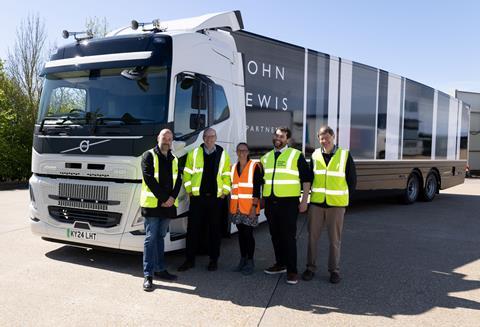John Lewis Partnership along with Volvo Trucks UK and Ireland and Flexible Power Systems have confirmed their participation in in Project JOLT (Joint Operator Logistics Trial), a collaborative initiative aimed at exploring the viability of electric heavy goods vehicles (HGVs) across various sectors in the UK.

Spearheaded by the Centre for Sustainable Road Freight (CSRF), the primary objective of Project JOLT is to gather valuable insights and data from trials involving electric HGVs in retail, delivery, and manufacturing settings. Partners will share experiences to develop comprehensive transition plans for their own operations and contribute to broader advancements in the logistics industry.
To facilitate this endeavor, specialists from Cambridge University and Heriot-Watt University will conduct thorough analyses, considering factors like vehicle performance, charging infrastructure, operational efficiency, and associated costs. Professor Philip Greening from Heriot-Watt University emphasises the importance of understanding the impact of electric HGVs on operators and supply chains, particularly in terms of range, load capacity, and charging requirements.
John Lewis Partnership will be employing a battery electric truck supplied by Volvo Trucks UK for its logistics operations. The selected vehicle, a Volvo FM 4x2 tractor unit, boasts a carrying capacity of up to 42 tonnes and a range of 300km on a single charge.
Project JOLT is part of CSRF’s broader mission to reduce carbon emissions in the road freight sector through collaboration between academia, industry, and government. Professor David Cebon, founder of Project JOLT, acknowledges the growing urgency of addressing climate Change and emphasises the need for a systematic approach to transitioning to electric HGVs.
Partners in Project JOLT will utilise fleet management software provided by Flexible Power Systems to optimise charging schedules and mitigate operational risks associated with transitioning to electric freight.


















